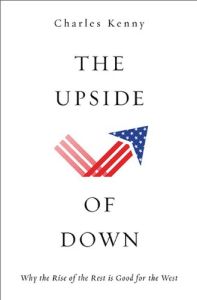Join getAbstract to access the summary!

Join getAbstract to access the summary!
Charles Kenny
The Upside of Down
Why the Rise of the Rest is Good for the West
Basic Books, 2014
What's inside?
The growing worldwide economic pie benefits everyone, including Americans.
Recommendation
China’s economy will soon surpass America’s. Europeans now rank higher than Americans on quality-of-life measures. While such global trends mean the US can’t forever remain the world’s political and economic arbiter, this shift presents new opportunities. Economist Charles Kenny says developing nations’ rising standards of living generate more opportunities for developed nations and for entrepreneurs worldwide. Because the economic world is not a zero-sum game, where one nation’s advance means another’s decline, the rise of China and India do not pose a threat to the US. Viewing them with fear, Kenny says, is the sort of fallacious thinking that breeds protectionism, animosity and conflict. His provocative message is that global prosperity benefits everyone and is closer now than ever before. The postcolonial future is coming, he says, and Americans should adapt. While prediction has obvious pitfalls, Kenny offers a fresh if somewhat rosy perspective on world economics, served with an intriguing future vision. While always politically neutral, getAbstract recommends his treatise to those seeking a groundbreaking, readable economics overview that backs its conclusions with specific, illuminating examples.
Summary
About the Author
Former World Bank senior economist, Charles Kenny wrote Getting Better: Why Global Development Is Succeeding – And How We Can Improve the World Even More. He’s a Center for Global Development senior fellow and a Bloomberg Businessweek and Foreign Policy columnist.

















Comment on this summary